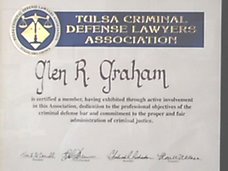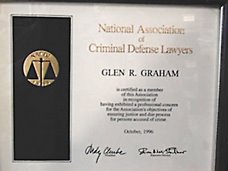Returning veterans may be in for a multitude of problems as exemplified in part by the Walter Reed Hospital scandal. Reports indicate that the Department of Veterans Affairs was ill-prepared for the sheer numbers and serious combat related and mental health and health and related issues of veterans of the Iraq and Afganistan Wars.
One issue that has yet to be addressed by the Oklahoma criminal court system is what services and special issues to deal with the special needs of veterans will the court establish (if any) to deal with the unique needs (both mental and social) of our veterans?
While military veterans represent 11 percent of the civilian adult population, they make up 26 percent of the homeless, according to data from the Department of Veterans Affairs and the Census Bureau. Counting all US veterans, 195,827 were homeless in January 2006 and an estimated 495,400 were homeless over the course of the year, the National Alliance to End Homelessness reported.
Around the country, community groups, local businesses, service organizations, clubs, and faith groups are helping build homes with special features or providing vehicles to accommodate wounded GIs.
As of November 5, 2007, the Brookings Institute is reporting 3,848 US soldiers killed, 28,451 and seriously wounded and of the 28,451 wounded, 20% have serious brain or spinal injuries (total excludes psychological injuries)
US Troops with Serious Mental Health Problems 30% of US troops develop serious mental health problems within 3 to 4 months of returning home
A review shows that the VA planned for a short and relatively bloodless war in Iraq, and then was slow to react when the war dragged on. In the military culture there is still a stigma attached to mental illness. Marines, especially, just aren't supposed to cry out for help.
PTSD estimates indicate the possibility that some veterans may be in for possible mental issues, depression, anxiety, outbursts, alcohol use, anti-anxiety medication, drug use, etc.
Organizations that want to help include:
America Supports You http://www.americasupportsyou.mil/
American Legion – Heroes to Hometowns (703) 908-6250 http://www.legion.org/
Checkpoint One Foundation (503) 871-3238 http://www.cponefoundation.org/
Homes for Our Troops 866-787-6677 http://www.homesforourtroops.org/
Iraq and Afghanistan Veterans of America (212) 982-9699 http://www.iava.org/
National Veterans Foundation 888-777-4443 http://www.nvf.org/
Returning Heroes Home http://www.returningheroeshome.org/
Swords to Plowshares (415) 252-4788 http://www.swords-to-plowshares.org/
US Welcome Home Foundation (520) 296-4686 http://www.uswelcomehome.org/
Veterans Outreach Center 866-906-8387 http://www.veteransoutreachcenter.org/
Veterans Village (209) 830-9955 http://www.veteransvillage.org/
Vets4Vets (520) 319-5500 http://www.vets4vets.us/
Returning Veterans Face Problems Upon Return --- Organizations Try to Help
Subscribe to:
Post Comments (Atom)






No comments:
Post a Comment